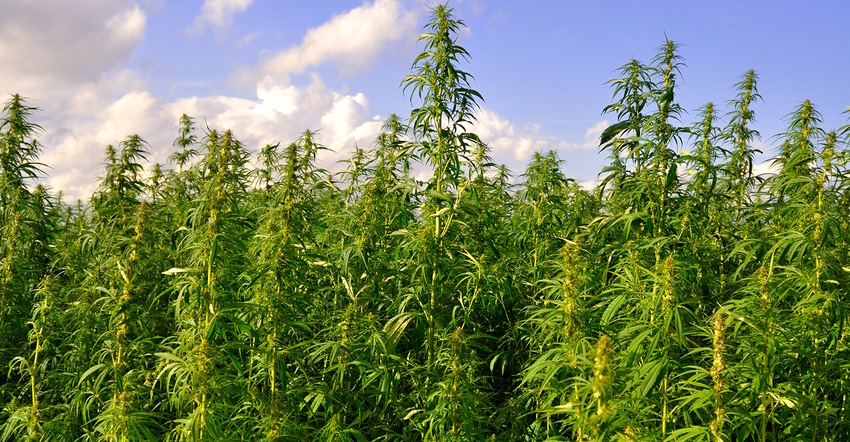February 11, 2019

By Troy Schneider
Farmers are always looking for ways to generate additional revenue for their farm, especially in a difficult farm economy like we are currently experiencing. Some farmers are looking at growing a new crop — specifically, industrial hemp. The purpose of this article is to give you a summary of hemp’s legal background, including its history and current legal status.
Hemp not marijuana
Cannabis is a plant, of which there are many varieties. Hemp is a variety that has been bred to produce fiber used in clothing and other materials, oils, lotions, seeds and other foods. Hemp contains very low levels of the psychoactive compound tetrahydrocannabinol (THC). Marijuana is another variety of cannabis that has been bred specifically for its psychoactive effects, and it contains high levels of THC.
Cannabidiol (CBD) is a compound from the cannabis plant that does not have psychoactive effects. Some believe that CBD has successful medical uses. Both hemp and marijuana contain CBD.
There are three main differences between hemp and marijuana. First, although hemp and marijuana are from the same plant species, they each contain a different genetic makeup, which makes them a different version of the same plant. For example, you may not know that Brussels sprouts, cabbage, kale, broccoli, cauliflower and kohlrabi all come from the same plant called brassica (also known as the wild mustard plant).
Second, and one of the biggest differences between hemp and marijuana, is the amount of THC the plants contain. Hemp contains less than 0.3% of THC, while marijuana contains, on average, between 5% and 20% of THC.
Third, there are significant differences in the way hemp and marijuana are grown. Marijuana is grown as a female plant that flowers, and the flowers contain the highest levels of THC. Hemp is typically a male plant that does not flower. Hemp is grown to produce large yields of plant materials and is typically harvested for its fiber.
History of hemp
Post-Independence and well into the 19th century, hemp was an incredibly valuable and important crop in the U.S. Then, in 1937, Congress passed the Marihuana Tax Act, which effectively began the era of hemp prohibition. In 1970, hemp was no longer considered distinct from marijuana under the Controlled Substances Act (CSA) signed by President Richard Nixon.
Under the 2014 Farm Bill, provisions were added that generated and protected research into hemp by pilot programs. Then, under the 2018 Farm Bill, hemp was officially removed from the CSA list. Senate Majority Leader Mitch McConnell was a strong supporter of the legislation; his home state of Kentucky has the right soil and climate for hemp production.
Legal status of hemp
The 2018 Farm Bill made hemp an official agricultural product. As such, hemp farmers are now afforded protection under the Federal Crop Insurance Act like other agricultural products. Also, hemp was redefined to include “its extracts, cannabinoids and derivatives.” As such, products such as CBD are also no longer on the CSA list.
Under the 2018 Farm Bill, states and tribal governments still may impose separate restrictions or requirements on hemp growth and the sale of hemp products. In Wisconsin, 2017 Act 100 was passed by the Wisconsin Legislature. The act does the following:
• directs the Wisconsin Department of Agriculture, Trade and Consumer Protection to establish a state industrial hemp program
• includes GPS coordinates, fee payment and a criminal history search as requirements for licenses
• directs DATCP to establish and administer a seed certification program or designate another agency to administer the program
• requires DATCP to create a pilot program to study the growth, cultivation and marketing of industrial hemp
• specifies exemptions from prosecution under the state Uniform Controlled Substances Act
• amends the definition of agricultural commodity to include industrial hemp
The state of Wisconsin’s rule regarding industrial hemp is found in ATCP 22. Also, DATCP’s website has a great deal of information regarding growing industrial hemp and the rules and regulations for hemp production in Wisconsin.
The 2018 Farm Bill changed federal policy regarding industrial hemp, including the removal of hemp from the Controlled Substances Act. However, hemp remains a highly regulated agricultural product under both federal and state law. Care must be taken that you are following all laws precisely.
 Schneider is a partner in the agricultural law firm of Twohig, Rietbrock, Schneider and Halbach. Call him at 920-849-4999.
Schneider is a partner in the agricultural law firm of Twohig, Rietbrock, Schneider and Halbach. Call him at 920-849-4999.
You May Also Like




